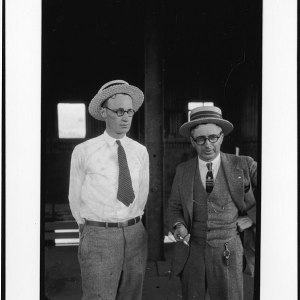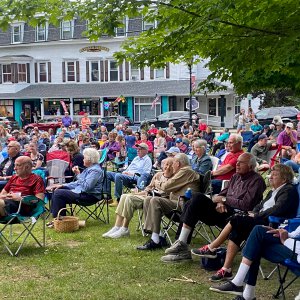
Latest News
 Vintage Views: The ugliest dog wins
Vintage Views: The ugliest dog wins
 Opinion: Monkey Trial centennial
Opinion: Monkey Trial centennial

Canterbury honors ‘real heroes’ with updated Military Veterans’ Project
Their names, written in John Goegel’s angular script, form tight rows of capital letters like a precision font: Benjamin and Joseph Sanborn, both veterans of the War of 1812. Peter Ayres, a teenage soldier in the American Revolution.

Homeyer: July flowers worth growing
July is a great month for blossoms – but only if you have planned for that to happen. Many gardeners go to their local nurseries in May and June, selecting plants in full bloom. But when July comes along, those gardeners are tired or hot or at the lake or in the mountains, and forget to keep on buying plants. Not me. July is a great month for blossoms – on trees, shrubs and perennials. Here are a few of my favorite July plants.
Most Read
 Warner shot down a housing developer’s bid. New statewide zoning mandates could clear a path for proposals like it.
Warner shot down a housing developer’s bid. New statewide zoning mandates could clear a path for proposals like it.
 How fast will NH’s universal school choice program grow?
How fast will NH’s universal school choice program grow?
 Federal government to appeal New Hampshire judge’s ruling on legal status of Dartmouth international student
Federal government to appeal New Hampshire judge’s ruling on legal status of Dartmouth international student
 ‘There’s tradition up here’ – Morrill Farm approaches its centennial, celebrates evolution and growth
‘There’s tradition up here’ – Morrill Farm approaches its centennial, celebrates evolution and growth
 AROUND CONCORD: Your guide to free summer music
AROUND CONCORD: Your guide to free summer music
 ‘It's borderline criminal’ – Manufactured housing was an affordable homeownership option. Now, investor-owned parks are pricing residents out
‘It's borderline criminal’ – Manufactured housing was an affordable homeownership option. Now, investor-owned parks are pricing residents out
Editors Picks
 A Webster property was sold for unpaid taxes in 2021. Now, the former owner wants his money back
A Webster property was sold for unpaid taxes in 2021. Now, the former owner wants his money back
 Report to Readers: Your support helps us produce impactful reporting
Report to Readers: Your support helps us produce impactful reporting
 City prepares to clear, clean longstanding encampments in Healy Park
City prepares to clear, clean longstanding encampments in Healy Park
 Productive or poisonous? Yearslong clubhouse fight ends with council approval
Productive or poisonous? Yearslong clubhouse fight ends with council approval
Sports

Sunapee’s Bryce Whitlow keeps memory of above-average MLB players alive through social media page ‘MLB Hall of (Pretty) Good’
Bryce Whitlow has worked as a paraeducator in Sunapee for two years, but outside of his day job, he’s the man behind a social media page called “MLB Hall of (Pretty) Good” that has taken online baseball media by storm.
 Concord Monitor Spring Players of the Season
Concord Monitor Spring Players of the Season
Opinion

Opinion: What Coolidge’s century-old decision can teach us today
One hundred years ago this July, a quiet man from Vermont — Calvin Coolidge — made a decision that changed the course of Sino-American relations.
 Opinion: The art of diplomacy
Opinion: The art of diplomacy
 Opinion: After Roe: Three years of resistance, care and community
Opinion: After Roe: Three years of resistance, care and community
 Opinion: Iran and Gaza: A U.S. foreign policy of barbarism
Opinion: Iran and Gaza: A U.S. foreign policy of barbarism
 Opinion: There’s no place like firearms-free zones
Opinion: There’s no place like firearms-free zones

Your Daily Puzzles

An approachable redesign to a classic. Explore our "hints."

A quick daily flip. Finally, someone cracked the code on digital jigsaw puzzles.

Chess but with chaos: Every day is a unique, wacky board.

Word search but as a strategy game. Clearing the board feels really good.

Align the letters in just the right way to spell a word. And then more words.
Politics

New Hampshire school phone ban could be among strictest in the country
When Gov. Kelly Ayotte called on the state legislature to pass a school phone ban in January, the pivotal question wasn’t whether the widely popular policy would pass but how far it would go.
 Sununu decides he won’t run for Senate despite praise from Trump
Sununu decides he won’t run for Senate despite praise from Trump
Arts & Life

AROUND CONCORD: Your guide to free summer music
With a good camp chair, a cool beverage and a worn, cozy sweatshirt, the perfect New England summer evening might just be enjoying the music of local musicians at dusk.
 Around Concord: Refreshing recipes from Table Bakery
Around Concord: Refreshing recipes from Table Bakery
 The Rebel Collective to perform in Henniker
The Rebel Collective to perform in Henniker
 Meet Moriah Billups, Young Professional of the Year
Meet Moriah Billups, Young Professional of the Year
 Artist spotlight: Leah Kuehne
Artist spotlight: Leah Kuehne
Obituaries
 Rose De Lima Locke
Rose De Lima Locke
Concord, NH - Rose de Lima Locke, 72, died May 2, 2025, after a long illness. She graduated from Ste. Marie High School. She worked at GE over 40 years and made many wonderful friends. She loved her family and friends. She loved her cat... remainder of obit for Rose De Lima Locke
 Joseph Wyatt
Joseph Wyatt
Loudon, NH - Joseph (Joe) Robert Wyatt, 45, of Loudon, NH passed away unexpectedly on June 25, 2025. Joe was born May 24, 1980 in Concord NH. Joe grew up in Loudon and was a graduate at Merrimack Valley High School. He dedicated his ti... remainder of obit for Joseph Wyatt
 Mark Saltsman
Mark Saltsman
Milton, FL - Mark Saltsman "Papa Salt" 67, passed away on June 18, 2025, in Atlanta GA. He left behind a wife, Teresa, 3 children, Dan, Tyler, and Nicolle and 4 grandchildren, Boaz, Storm, Sunrise, and Ellie. Mark had an unwavering love... remainder of obit for Mark Saltsman
 Winston H. McCarty
Winston H. McCarty
Tilton, NH - Winston 'Win' Herbert McCarty died on June 26, 2025, at the New Hampshire Veterans Home, following a heart attack. At the time of his passing, he was surrounded by family, caregivers and fellow veterans. He was 96. Wins... remainder of obit for Winston H. McCarty

 As Concord’s Gavin Richardson places second at golf Junior Amateur, young players look ahead to the 122nd State Amateur Championship
As Concord’s Gavin Richardson places second at golf Junior Amateur, young players look ahead to the 122nd State Amateur Championship
 Around Concord: Steps to nowhere – but it used to be somewhere
Around Concord: Steps to nowhere – but it used to be somewhere

 Six local seniors play in CHaD East-West All-Star Football game; Nyhan wins MVP
Six local seniors play in CHaD East-West All-Star Football game; Nyhan wins MVP Athlete of the Week: Nate Kiah, Bow Falcons
Athlete of the Week: Nate Kiah, Bow Falcons Track & field: Hopkinton’s Lane wins New England title in 3,200 meters, Concord’s Saysaw runs state record times in 100 and 200
Track & field: Hopkinton’s Lane wins New England title in 3,200 meters, Concord’s Saysaw runs state record times in 100 and 200 Concord became a Housing Champion. Now, state lawmakers could eliminate the funding.
Concord became a Housing Champion. Now, state lawmakers could eliminate the funding. ‘A wild accusation’: House votes to nix Child Advocate after Rep. suggests legislative interference
‘A wild accusation’: House votes to nix Child Advocate after Rep. suggests legislative interference  Town elections offer preview of citizenship voting rules being considered nationwide
Town elections offer preview of citizenship voting rules being considered nationwide
